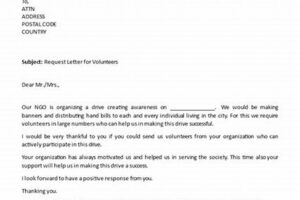Table of Contents
In a world where selflessness and compassion often go unnoticed, volunteers stand out as beacons
of hope, dedicating their time and energy to make a positive impact on society. These
remarkable individuals deserve our deepest gratitude and appreciation for their unwavering
commitment to causes they believe in. Sending a heartfelt thank-you message is a small but
meaningful way to acknowledge their contributions and show them how much their efforts
are valued.
Beyond simply saying “thank you,” crafting a thoughtful message that expresses your sincere
appreciation can leave a lasting impression on volunteers. Taking the time to acknowledge
their specific contributions, highlight the impact of their work, and convey your gratitude
personally can make all the difference. In this article, we will explore various ways to compose
compelling thank-you messages for volunteers, ensuring that their efforts are celebrated
and appreciated.
To delve deeper into the art of crafting effective thank-you messages, let’s first explore the
importance of personalizing your message and adapting it to the volunteer’s unique role and
contribution.
thank you messages for volunteers
Craft messages that are genuine and sincere.
- Express gratitude for volunteers’ time and effort.
- Acknowledge their specific contributions.
- Highlight the impact of their work.
- Convey a sense of personal connection.
- Use sincere and heartfelt language.
- Tailor messages to the volunteer’s role and contribution.
- Keep messages brief and to the point.
- Proofread for grammar and spelling errors.
- Send messages in a timely manner.
- Make messages a part of your ongoing volunteer engagement strategy.
By following these guidelines, you can create thank-you messages that leave a lasting impression on volunteers and foster a sense of appreciation for their contributions.
Express gratitude for volunteers’ time and effort.
At the heart of any thank-you message for volunteers lies the expression of gratitude for their selfless contribution of time and effort. This is the foundation upon which all other elements of the message are built. Begin by acknowledging their willingness to share their precious time and energy with your cause or organization. Use words that convey your sincere appreciation for their commitment, such as “We are truly grateful for your dedication” or “Your contribution of time and effort is invaluable to us.”
Go beyond generic expressions of thanks by personalizing your message to reflect the specific volunteer’s involvement. If possible, mention the tasks they performed, the projects they contributed to, or the events they supported. This demonstrates that you value their unique contribution and recognize the impact they have made. For instance, you could say, “Your work on the fundraising committee was instrumental in securing the necessary funds for our new community center” or “Your tireless efforts at the food bank have made a tangible difference in the lives of countless families.”
When expressing gratitude for volunteers’ time and effort, it’s important to be genuine and heartfelt. Avoid using clichéd or generic phrases that may come across as insincere. Instead, focus on conveying your authentic appreciation for their contribution. Share how their involvement has made a positive impact on your organization, the community, or the cause you are working towards. A heartfelt thank-you message shows volunteers that their efforts are valued and appreciated, which can motivate them to continue their involvement and inspire others to join the cause.
Finally, remember that expressing gratitude for volunteers’ time and effort is an ongoing process. Make it a regular practice to show your appreciation, both verbally and in writing. Send thank-you messages after specific events or projects, recognize volunteers during meetings or gatherings, and find other opportunities to let them know how much you value their contribution. By consistently expressing your gratitude, you create a culture of appreciation that fosters a sense of belonging and motivation among your volunteers.
By taking the time to express your sincere gratitude for volunteers’ time and effort, you not only acknowledge their contribution but also strengthen your relationship with them and encourage their continued involvement.
Acknowledge their specific contributions.
Beyond expressing general gratitude, it’s important to acknowledge volunteers’ specific contributions in your thank-you message. This shows that you recognize and value their unique skills, talents, and efforts.
- Mention specific tasks or projects:
If possible, mention the specific tasks or projects that the volunteer was involved in. This could be anything from organizing a fundraiser to tutoring students or providing administrative support. By highlighting their specific contributions, you show that you are aware of their work and appreciate the impact they have made.
- Recognize their skills and expertise:
Take the time to acknowledge the skills and expertise that the volunteer brought to your organization. This could be their professional skills, their personal talents, or their lived experiences. By recognizing their unique contributions, you show that you value their individuality and the diversity of perspectives they bring to your team.
- Highlight the impact of their work:
Don’t just thank volunteers for their time and effort; explain how their work has made a positive impact on your organization, the community, or the cause you are working towards. Share specific examples of how their contributions have made a difference. This helps volunteers see the tangible results of their efforts and reinforces the importance of their involvement.
- Express appreciation for their dedication and commitment:
Finally, express your appreciation for the volunteer’s dedication and commitment. Acknowledge that their consistent involvement and willingness to go the extra mile have made a significant difference. This shows that you value their loyalty and recognize the sacrifices they have made.
By acknowledging volunteers’ specific contributions, you demonstrate that you are paying attention to their work and that you genuinely appreciate their efforts. This can motivate them to continue their involvement and inspire others to join your cause.
Highlight the impact of their work.
When thanking volunteers, it’s not enough to simply acknowledge their contributions; you should also highlight the impact of their work. This shows them that their efforts have made a real difference and that their involvement has been invaluable.
To effectively highlight the impact of volunteers’ work, consider the following tips:
- Be specific:
Don’t just say “your work made a difference”; explain exactly how it made a difference. Provide concrete examples of the positive outcomes that resulted from their contributions. For instance, you could say, “Your fundraising efforts helped us purchase new equipment for our community center, which has allowed us to serve more people in need” or “Your work with our after-school program has helped our students improve their grades and develop new skills.” - Share stories:
Nothing brings the impact of volunteers’ work to life like a personal story. Share anecdotes or testimonials from beneficiaries or colleagues that illustrate the positive changes that have occurred as a result of their involvement. This helps volunteers see the human face of their work and understand the real-world impact of their contributions. - Use data and metrics:
Whenever possible, use data and metrics to quantify the impact of volunteers’ work. This could include statistics on the number of people served, the amount of money raised, or the number of lives improved. Hard data provides tangible evidence of the difference that volunteers have made and reinforces the importance of their contributions. - Express your gratitude:
Finally, don’t forget to express your sincere gratitude for the impact that volunteers have made. Let them know that their work has been instrumental in achieving your organization’s goals and that you are truly grateful for their dedication and commitment.
By highlighting the impact of volunteers’ work, you show them that their efforts are valued and appreciated. This can motivate them to continue their involvement, inspire others to join your cause, and ultimately make a lasting difference in the world.
Take the time to craft thoughtful and meaningful thank-you messages that acknowledge volunteers’ specific contributions and highlight the impact of their work. These messages will not only express your gratitude but also inspire and motivate volunteers to continue their involvement and make an even greater difference.
Convey a sense of personal connection.
In addition to expressing gratitude and acknowledging their contributions, it’s important to convey a sense of personal connection in your thank-you messages to volunteers. This shows volunteers that you value them as individuals and that you appreciate the relationship you have built with them.
Here are some tips for conveying a sense of personal connection in your thank-you messages:
- Use their name:
Always address volunteers by their name in your thank-you message. This simple gesture shows that you know them as individuals and that you value their unique contributions. - Share personal anecdotes:
If you have a personal anecdote or story that highlights the volunteer’s impact, share it in your message. This could be a story about how their work has made a difference in your life or in the life of someone you know. Sharing personal anecdotes helps volunteers feel connected to you and to the cause you are working towards. - Express your admiration and respect:
Take the time to express your admiration and respect for the volunteer’s work and dedication. Let them know that you value their skills, talents, and commitment. This shows that you genuinely appreciate their involvement and that you recognize the positive impact they have made. - Thank them for their friendship:
If you have developed a friendship with the volunteer, express your gratitude for their friendship as well as their contributions. This shows that you value them not only as a volunteer but also as a person.
By conveying a sense of personal connection in your thank-you messages, you create a stronger bond with volunteers and foster a sense of community and belonging. This can motivate them to continue their involvement, inspire others to join your cause, and ultimately make a lasting difference in the world.
Remember, volunteers are the backbone of many organizations and causes. They give their time and energy selflessly to make a difference. By taking the time to craft thoughtful and meaningful thank-you messages that convey your gratitude, acknowledge their contributions, highlight the impact of their work, and convey a sense of personal connection, you can show volunteers how much you value their involvement and inspire them to continue making a positive impact.
Use sincere and heartfelt language.
Above all else, your thank-you messages to volunteers should be sincere and heartfelt. Volunteers can easily tell when a message is generic or insincere, so take the time to craft a message that comes from the heart.
Here are some tips for using sincere and heartfelt language in your thank-you messages:
- Be authentic:
Don’t try to be someone you’re not. Be yourself and let your genuine appreciation for volunteers shine through in your words. - Use specific examples:
When thanking volunteers, use specific examples of their contributions and the impact they have made. This shows that you are paying attention to their work and that you genuinely appreciate their efforts. - Avoid clichés:
Steer clear of overused clichés and generic phrases. Instead, use fresh and original language that conveys your sincere gratitude. - Proofread your message:
Before sending your thank-you message, proofread it carefully for errors in grammar and spelling. A well-written message shows that you have taken the time to craft a thoughtful and meaningful message.
When you use sincere and heartfelt language in your thank-you messages, volunteers can feel your genuine appreciation for their contributions. This can motivate them to continue their involvement, inspire others to join your cause, and ultimately make a lasting difference in the world.
Remember, volunteers are the lifeblood of many organizations and causes. They give their time and energy selflessly to make a difference. By taking the time to write sincere and heartfelt thank-you messages, you can show volunteers how much you value their involvement and inspire them to continue making a positive impact.
Tailor messages to the volunteer’s role and contribution.
To create truly meaningful thank-you messages, take the time to tailor your message to the volunteer’s specific role and contribution. This shows that you have paid attention to their unique efforts and that you appreciate the value they have added to your organization or cause.
- Acknowledge their specific skills and talents:
If the volunteer has used their specific skills or talents to make a significant contribution, be sure to acknowledge this in your thank-you message. For example, you could say, “Your graphic design skills were instrumental in creating our new marketing materials” or “Your experience in event planning was invaluable in making our fundraiser a success.” - Recognize their dedication and commitment:
If the volunteer has gone above and beyond in their role, be sure to recognize their dedication and commitment. You could say, “We are so grateful for your willingness to go the extra mile” or “Your commitment to our cause has been truly inspiring.” - Highlight the impact of their work:
Tailor your message to highlight the specific impact that the volunteer’s work has had on your organization or cause. For example, you could say, “Your work with our youth program has made a real difference in their lives” or “Your fundraising efforts have helped us to provide essential services to our community.” - Express your gratitude for their unique contribution:
Finally, express your gratitude for the volunteer’s unique contribution to your organization or cause. Let them know that their involvement has made a positive difference and that you are grateful for their support. You could say, “We are so lucky to have you as a volunteer” or “Your contribution to our team has been invaluable.”
By tailoring your thank-you messages to the volunteer’s role and contribution, you show them that you value their unique efforts and that you appreciate the positive impact they have made. This can motivate them to continue their involvement, inspire others to join your cause, and ultimately make a lasting difference in the world.
Keep messages brief and to the point.
While it’s important to express your gratitude and appreciation in your thank-you messages, it’s also important to keep your messages brief and to the point. Volunteers are busy people, and they appreciate messages that are concise and easy to read.
Here are some tips for keeping your thank-you messages brief and to the point:
- Get to the point quickly:
Start your message with a clear and concise expression of gratitude. Avoid long-winded introductions or unnecessary details. - Use concise language:
Choose your words carefully and avoid using jargon or technical terms that your volunteers may not understand. Use simple, easy-to-understand language that gets your message across clearly and effectively. - Focus on the most important points:
Don’t try to cram too much information into your thank-you message. Focus on the most important points, such as expressing your gratitude, acknowledging their specific contributions, and highlighting the impact of their work. - Proofread your message:
Before sending your thank-you message, proofread it carefully for errors in grammar and spelling. A well-written message shows that you have taken the time to craft a thoughtful and meaningful message.
By keeping your thank-you messages brief and to the point, you show volunteers that you respect their time and that you appreciate their attention. This can make your messages more impactful and memorable.
Remember, volunteers are the backbone of many organizations and causes. They give their time and energy selflessly to make a difference. By taking the time to write brief and to the point thank-you messages, you can show volunteers how much you value their involvement and inspire them to continue making a positive impact.
Proofread for grammar and spelling errors.
Before sending your thank-you message to volunteers, take the time to proofread it carefully for grammar and spelling errors. A well-written message shows that you have taken the time to craft a thoughtful and meaningful message, while errors can detract from your message and make it appear unprofessional.
- Use a grammar and spell checker:
Most word processing programs have built-in grammar and spell checkers that can help you identify errors. Run your message through the checker before sending it to catch any potential mistakes. - Read your message aloud:
Reading your message aloud can help you catch errors that you might miss when reading silently. Listen for any awkward phrasing or sentences that don’t sound quite right. - Ask a friend or colleague to review your message:
If you’re unsure about whether your message is error-free, ask a friend, colleague, or family member to review it for you. A fresh set of eyes can often spot errors that you may have missed. - Proofread your message multiple times:
Don’t just proofread your message once and assume it’s perfect. Proofread it multiple times, carefully checking for any errors. It’s easy to miss errors when you’re reading quickly, so taking the time to proofread slowly and carefully is important.
By proofreading your thank-you messages for grammar and spelling errors, you show volunteers that you are professional and that you care about the quality of your communication. This can make your messages more impactful and memorable.
Send messages in a timely manner.
Timeliness is an important factor to consider when sending thank-you messages to volunteers. Sending your message soon after the volunteer’s involvement shows that you are grateful for their contribution and that you value their time.
- Send your message within a week:
Aim to send your thank-you message within a week of the volunteer’s involvement. This shows that you are prompt and that you appreciate their contribution while it is still fresh in their mind. - Be flexible with your timing:
While it’s ideal to send your thank-you message within a week, there may be times when this is not possible. For example, if you are working with a large group of volunteers or if the volunteer’s involvement was short-term, it may take longer to send your message. In these cases, be flexible with your timing and send your message as soon as possible. - Consider sending a personalized message:
If you have the time and resources, consider sending a personalized thank-you message to each volunteer. This shows that you have taken the time to recognize their individual contribution and that you appreciate their involvement. - Follow up with volunteers regularly:
In addition to sending a thank-you message after the volunteer’s involvement, make an effort to follow up with them regularly. This could involve sending them updates on the project they worked on, inviting them to upcoming events, or simply reaching out to say hello. Regular follow-up shows volunteers that you value their involvement and that you are committed to building a lasting relationship with them.
By sending thank-you messages to volunteers in a timely manner, you show that you appreciate their contribution and that you are committed to building a strong relationship with them. This can motivate them to continue their involvement, inspire others to join your cause, and ultimately make a lasting difference in the world.
Make messages a part of your ongoing volunteer engagement strategy.
Sending thank-you messages to volunteers should not be a one-time occurrence; it should be an integral part of your ongoing volunteer engagement strategy. By consistently expressing your gratitude and appreciation, you can build stronger relationships with volunteers, motivate them to continue their involvement, and inspire others to join your cause.
Here are some tips for making thank-you messages a part of your ongoing volunteer engagement strategy:
- Develop a system for tracking volunteer involvement:
Create a system for tracking volunteer involvement, such as a volunteer database or spreadsheet. This will help you keep track of when volunteers have participated in activities, the tasks they have performed, and the impact they have made. This information can be used to personalize your thank-you messages and to identify volunteers who deserve special recognition. - Send regular thank-you messages:
Make it a practice to send thank-you messages to volunteers on a regular basis. This could be after each volunteer event, project, or meeting, or it could be on a monthly or quarterly basis. Regular thank-you messages show volunteers that you are consistently grateful for their involvement and that you value their contribution. - Use a variety of communication channels:
Don’t just rely on one communication channel to send your thank-you messages. Use a variety of channels, such as email, social media, handwritten notes, and phone calls, to reach volunteers and express your gratitude. This shows volunteers that you are making an effort to connect with them in a meaningful way. - Recognize volunteers publicly:
In addition to sending personal thank-you messages, take the opportunity to recognize volunteers publicly. This could be done through social media posts, articles in your organization’s newsletter, or at volunteer recognition events. Public recognition shows volunteers that you are proud of their work and that you value their contribution to your organization or cause.
By making thank-you messages a part of your ongoing volunteer engagement strategy, you can create a culture of appreciation and gratitude within your organization. This can motivate volunteers to continue their involvement, inspire others to join your cause, and ultimately make a lasting difference in the world.
Remember, volunteers are the backbone of many organizations and causes. They give their time and energy selflessly to make a difference. By consistently expressing your gratitude and appreciation, you can show volunteers how much you value their involvement and inspire them to continue making a positive impact.
FAQ
Have questions about volunteering? Here are some frequently asked questions and answers to help you get started:
Question 1: How can I find volunteer opportunities?
Answer 1: There are many ways to find volunteer opportunities. You can search online, contact local organizations directly, or check with your school or place of worship. You can also use volunteer matching platforms to find opportunities that match your interests and skills.
Question 2: What skills do I need to volunteer?
Answer 2: The skills you need to volunteer will vary depending on the opportunity. However, some common skills that are valued by volunteer organizations include communication, teamwork, problem-solving, and flexibility. You may also need specific skills or experience for certain roles.
Question 3: How much time do I need to commit to volunteering?
Answer 3: The time commitment required for volunteering will vary depending on the opportunity. Some opportunities may only require a few hours of your time, while others may require a more significant commitment. Be sure to ask about the time commitment before signing up for a volunteer opportunity.
Question 4: What are the benefits of volunteering?
Answer 4: There are many benefits to volunteering, including the opportunity to give back to your community, meet new people, learn new skills, and gain valuable experience. Volunteering can also help you improve your mental and physical health and boost your overall sense of well-being.
Question 5: How can I make the most of my volunteer experience?
Answer 5: To make the most of your volunteer experience, be sure to choose an opportunity that you are passionate about and that allows you to use your skills and interests. Be prepared to learn new things and be flexible. Be respectful of the organization and the people you are working with, and always be willing to help out where needed.
Question 6: How can I get involved in my community?
Answer 6: There are many ways to get involved in your community. You can volunteer your time, donate to local organizations, or simply be a good neighbor. Attend community events, support local businesses, and stay informed about local issues. By getting involved in your community, you can make a difference and help to create a better place to live for everyone.
Volunteering is a rewarding experience that can benefit both you and your community. If you are interested in volunteering, there are many resources available to help you get started. With a little effort, you can find an opportunity that is a good fit for your interests and skills.
In addition to the information provided in the FAQ section, here are a few additional tips for volunteers:
Tips
Here are a few practical tips to help you get the most out of your volunteer experience:
Tip 1: Choose an opportunity that you are passionate about.
When you are passionate about the cause or organization you are volunteering for, you are more likely to be motivated and engaged. This will make your volunteer experience more enjoyable and rewarding.
Tip 2: Be prepared to learn new things.
Volunteering is a great opportunity to learn new skills and expand your knowledge. Be open to trying new things and taking on new challenges. The skills you learn through volunteering can benefit you in your personal and professional life.
Tip 3: Be flexible and adaptable.
Things don’t always go according to plan when you are volunteering. Be prepared to be flexible and adaptable. Be willing to change your plans if necessary and to help out wherever you are needed.
Tip 4: Be respectful and professional.
When you are volunteering, you are representing the organization you are working with. Be respectful of the organization, the people you are working with, and the people you are serving. Always be professional in your conduct and demeanor.
Volunteering is a rewarding experience that can benefit both you and your community. By following these tips, you can make the most of your volunteer experience and make a positive impact on the world.
Remember, volunteering is about giving back to your community and making a difference. By following these tips, you can ensure that your volunteer experience is a positive and rewarding one.
Conclusion
Volunteering is a powerful way to give back to your community and make a difference in the world. Whether you are interested in working with children, the elderly, animals, or the environment, there are countless opportunities to get involved. Volunteering can be a rewarding experience that can benefit both you and the people you are helping.
When you volunteer, you are not only helping others; you are also learning new skills, expanding your network, and making a positive impact on your community. Volunteering can also help you to improve your mental and physical health and boost your overall sense of well-being.
If you are interested in volunteering, there are many resources available to help you get started. You can search online, contact local organizations directly, or check with your school or place of worship. You can also use volunteer matching platforms to find opportunities that match your interests and skills.
No matter how much time or money you have to give, there is a volunteer opportunity out there for you. By getting involved, you can make a difference in your community and help to create a better world for everyone.
So what are you waiting for? Get involved today and start making a difference!






